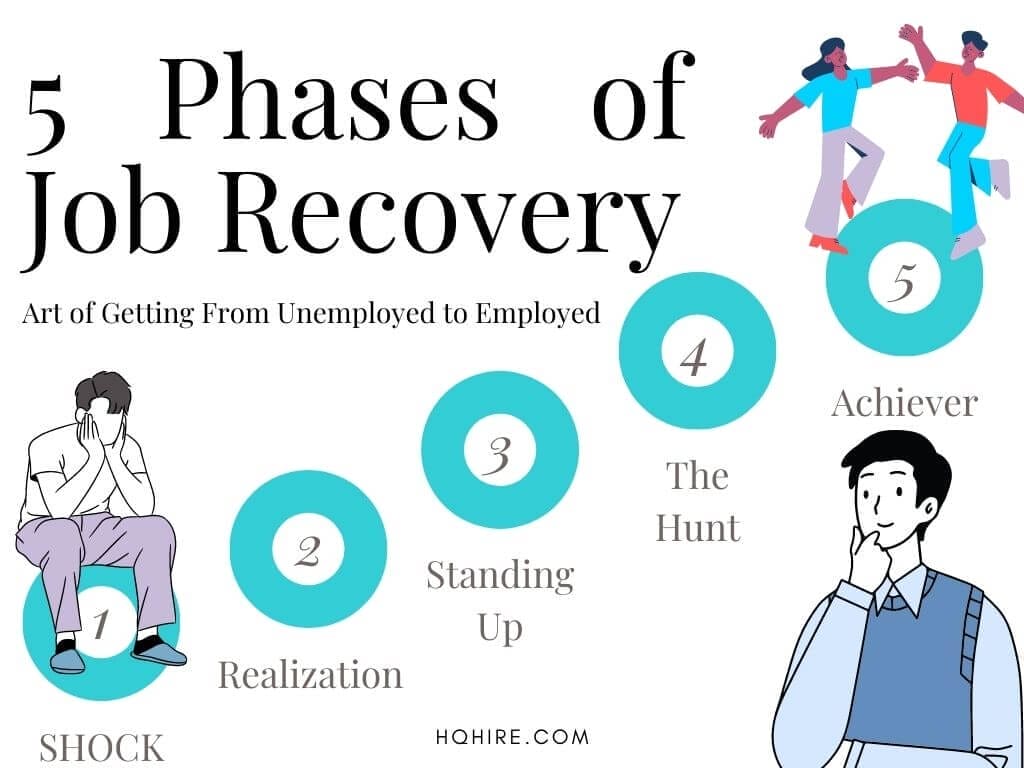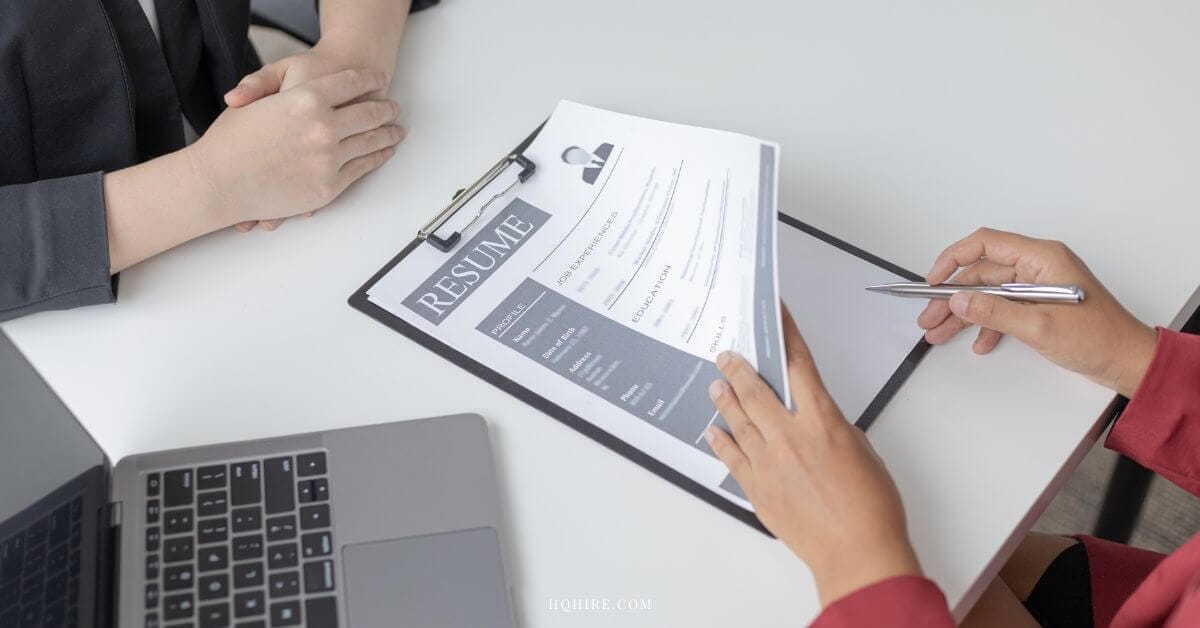You are fired from your job, now what?
While the emotional trauma of being laid off from your job can be pretty painful, losing your job is definitely not the end of the world.
In fact, this might be a good time to get a better job than your last one.
Often, people get terminated from their job due to “fit issues”. not performance.
So what happens when you get laid off from work?

5 Stages Of Grief After Job Loss
Stage 1: Feeling shocked from losing your job
Today is your day 1 of getting fired.
The first thing to do.
Go Home.
Immediately write down what are your roles and responsibility of your job. The achievements you’ve completed during your employment.
Remember to include the dates.
Put it all in your resume or right at the top of your resume, so you can come back and edit it later.
What is the most common day to be fired?
According to studies, Tuesday and Friday are the most common days of the week when employees are being let go.
Tuesday is the preferred day of the week, as it gives HR and the manager sufficient time to ensure all paperwork and communication are ready.
But if you are in a mid-level job, you’ll have a higher chance to be let go on a Friday.
And if you were working at a toxic workplace, a layoff can be dramatic.
Employees who are being fired on a Friday leads to fewer aftermath incidence.
With fewer people around in the office on most Fridays, fewer people mean less drama.
Regardless, since you are still in shock from being laid off.
Just spend your evening wallowing in your sorrow.
Or celebrate your freedom from the bondage of your nightmare.
Drink if you want, but limit your spending.
Preferably, do your drinking at home with some great friends.
The first day of getting fired can be tough.
Stage 2: Realize that you are Jobless
Sobering up from the intoxication, today is day 2 of getting fired.
You’ve just realized you are without a job and an income.
It’s now time for you to assess your financial situation.
Set Your Home Budget
Do a quick budget for all your essential spending and non-essential spending.
If possible, lower all your non-essential spending to zero.
Check Your Healthcare Coverage
Without a job, your healthcare benefits will probably be non-existent as well.
Immediately check if you can still get your appointments or prescription under your ex-company. Take note of when your health benefits are expiring.
Or maybe, it is time for you to get personal health insurance.
The cost of healthcare can be quite scary without insurance.
How expensive is a healthcare without health insurance?
Without health insurance, the average doctor appointment costs between $300–$600 in the United States.
However, the cost of healthcare may vary depending on the services and treatment required.
Every one of your benefits is about to have a major change.
Sometimes, the truth sucks.
Stage 3: Standing Up and Rising High
You can’t be jobless forever, it’s time for you to pick yourself up again.
Build a new and improved version of your resume.
It had been years since you last updated your resume.
Now it is the time for you to put in all the relevant skills (soft skills and hard skills) and experience you have acquired in your past employment.
Give yourself a deadline.
Use goal-setting strategies to help you to set your deadline if that helps.
An example of a great deadline will is,
“I’ll create a brand new resume before coming Monday.”
If you need a break, give yourself a week or two.
But never go beyond two weeks. Because it will look bad on your resume.
Stage 4: Hunt For A Job
Equip with a brand new resume, it is time for you to shine at a new and brighter future.
Kickstart your campaign on Monday morning and do these 3 things:
- Get on LinkedIn, and update your profile.
- Get on the Monster and indeed portal, and update your resume.
- Find every job search website, and upload and update your resume.
How to increase your chances of getting a job interview?
Add a Cover Letter to your application.
Why?
A cover letter helps you in your job search in 3 ways:
- 26% of Recruiters read cover letters which is critical for the decision to hire.
- 56% of Employers want applicants to attach a cover letter to the resume.
- 49% of HR managers say the cover letter is the best way to give your resume a boost
Phase 5: Be an Achiever
Failing to plan is planning to fail.
To evolve into a Stage 5 Achiever, you’ll need to create your “Getting from unemployed to employed” plan.
- Every morning is called “look for a job“.
- Every afternoon is open for any potential interviews and calls.
- Every late afternoon is getting educated and growing your industrial knowledge.
- Finally, repeat.
Keep improving and updating your resume.
Keep making your resume better than the previous version. Make a version 2…3…4…5…and so on…
How to create a resume fast?
Create a general resume that includes:
- Highest education attended
- List of soft skills
- List of hard skills
- Work experience
- Achievements
Using your general resume as a foundation, create variations of different resumes tailored to the specific jobs and roles that you apply for.
Remove all irrelevant information and keep only the information that your employer may need to assess if you are the right candidate to come for the interview.
If you are applying for 10 different job roles, you should have at least 10 different resumes tailored to each of the job roles.
And if you lack the skills required, go learn new skills and get certifications from some of the most popular online learning platforms.
How to increase your chances of getting a job?
Call your friends and ex-colleagues and let them know you are looking for a job. Getting a job through referral is the easiest way to get a job fast.
While referral doesn’t guarantee you a job, getting a job through referral increase the chances that your job application to be seen by a recruiter or hiring manager. A referral is an endorsement made by an employee to your potential employer that you are the right fit for the specific position
Referral from a friend is the most trusted form of marketing of your skills and experience to your potential employer.
Are referrals more likely to get hired?
A job seeker who is referred is up to 4x times more likely to be hired than someone who applies without a referral.
The main reason why referrals are more likely to get hired is simply that, these applicants often pass the initial recruitment filtering process, where they have the opportunity to be viewed by a recruiter or the hiring manager.
Most applicants who applied through conventional means are filtered out at the first round of the recruitment process using computer programs. These computer programs screen and shortlist potential candidates for the recruiter to further assess their relevancy.
Companies prefer to use employee referrals because they’re budget-friendly. Furthermore, these qualified referrals are often a better fit than candidates selected from a job board.
But if you want to get a job even faster.
Here are some smart things you can do if you are jobless and broke.
Going from Unemployed to Employed
Each profession has its own unique way of finding a job.
From getting fired to getting your next job, these are just some stages you may go through.
Stages of Job Recovery from Unemployed to Employed:
- Stage 1: Shock
- Stage 2: Realization
- Stage 3: Standing up
- Stage 4: The Hunt
- Stage 5: Achiever
If you have a plan, not only you’ll be more motivated and keep yourself from falling into depression, you’ll probably get a job sooner than you’ve ever expected.
Another get way to get hired is to invest in yourself.
Take up some online courses and make yourself more employable.
Here we’ve made an in-depth comparison between some of the best platforms to learn online courses.
Spend your late afternoon and evening working on improving yourself.
You can thank me later.
Like this advice?
Let us know in the comments below!
Wait a minute…
Do you have a story to share?
Share your story with our community by Clicking “Submit Your Story” below!
Up Next… How much money do you need to be happy? Science has the answer!
- Number of PMP Certified Holders By Country in 2025 (Global Statistics 211 Countries)
- 12 Remote Work Statistics in 2025 (WFH is the Future)
- Jobs of The Future [2025 Job Future Outlook]
- 24 Surprising Business Strategy Statistics in 2025 (Business & Management Team)
- How Far is Too Far? Reasonable Commute Time and Distance to Work [2025]
Join over 11,000+ achievers who are committed to achieving their career goals!






